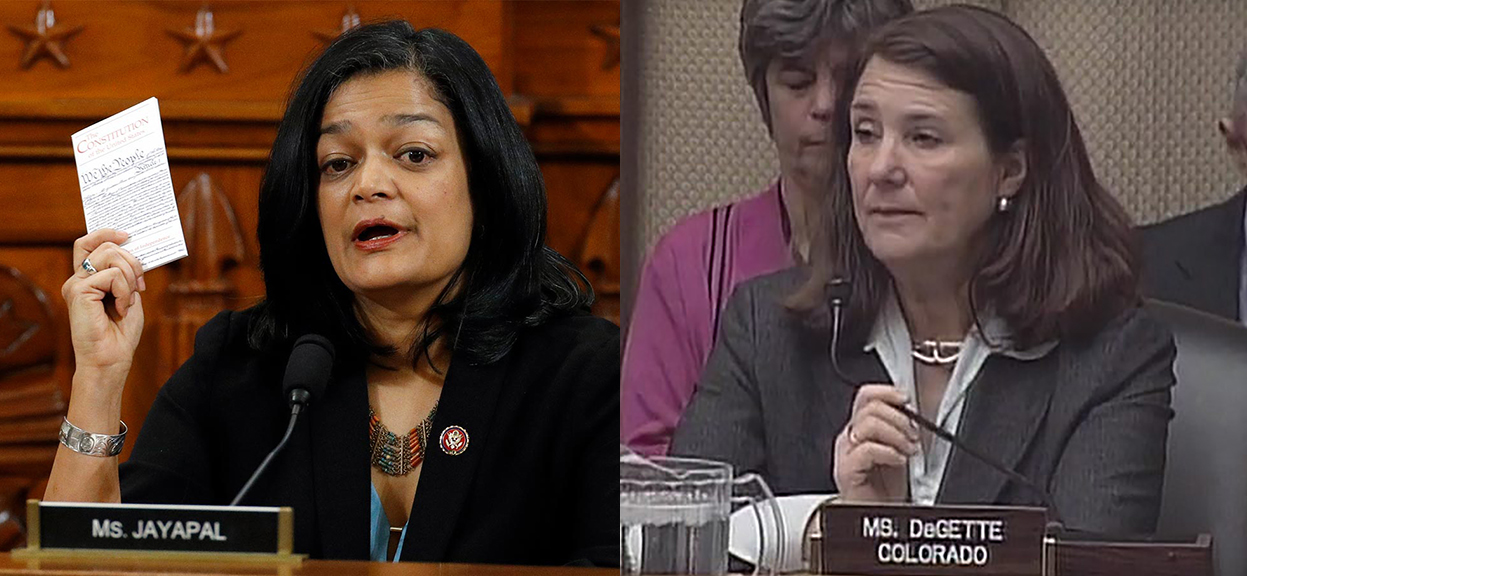How to Address a Representative, Congressman or Congresswoman
——–Also on this Page:
-V——-Member of Congress-Elect
—V-—-Former Member of Congress
V—-—-With a Doctorate
–V–—-And Spouse
Member of the U.S. House of Representatives
How to Address a Representative
How to Address a Congressman or Congresswoman
—-Envelope or address block on an email:
——–The Honorable (Full Name)
——–(Room) (Name of House Office Building)
——–United States House of Representatives
——–Washington, DC 20515
—-Official envelope as chairman of a committee or subcommittee:
——–The Honorable (Full Name)
——–Chairman
——–(Committee or subcommittee name)
——–(Address)
—-———-—-or
—————-The Honorable (Full Name)
—————-Chair
—————-(Committee or subcommittee name)
—————-(Address)
—-Letter salutation:
——–Dear Mr./Ms. (Surname):
——————-See NOTE below
—–—Congressman (Surname):
—–—Congresswoman (Surname):
—–—Representative (Surname):
Robert Hickey author of “Honor & Respect”
NOTE ON HONORIFICS: It surprises many that the first option for a salutation when addressing a member of the U.S. House of Representatives is Mr./Ms. (Surname) rather than Congressman (Surname), Congresswoman (Surname) and Representative (Surname). Congressman, Congresswoman and Representative are in fact less formal honorifics.
Members often prefer Congressman (Surname), Congresswoman (Surname) or Representative (Surname). I’d describe it as a practice which emphasizes the office held in a way Mr./Ms. (Surname) does not.
RE: Congressman and Congresswoman: Purists say that since ‘Congress’ is comprised of two bodies – the Senate and the House of Representatives – members of both houses are technically ‘Congressmen’. But in the public’s mind Congressman/Congresswoman identify members of the House.
WHAT TO DO? If you know the Member prefers Congressman/Congresswoman (Surname) or Representative (Surname) – use their preferred form in conversation. Often you can find out their preference by looking at the banner on their website. Typically they present their name there using one of the three honorifics.
But back to formal correspondance – in writing it’s the Honorable (Full Name) and in a salutation as Mr. (Name) or Ms. (Name) as noted above.
Sorry for this long note!
— Robert Hickey
BELOW: Note how on Capitol Hill members (seated behind their committee name plates) are Mr./Ms./Mrs. (Surname) How to Address a Congressman Congresswoman How to Address a Congressman Congresswoman



Robert Hickey author of “Honor & Respect”
How to Address a US Representative-Elect?
How would I address someone elected to the House of Representatives, but not yet sworn in?
—————-– Mike
Dear Mike,
A representative-elect is addressed in writing as:
—-Official envelope:
—-—-The Honorable (Full Name)
—-—-(Address)
—-And in conversation as …
—-—-Mr./Ms./etc. (Surname)
Officials become the Honorable once elected. In conversation or a salutation use the honorific to which they are entitled prior to taking office.
They will be addressed orally or in a salutation as ‘Congressman/woman (Surname)’ or ‘Representative (Surname)’ once they have taken the oath of office.
– Robert Hickey How to Address a Congressman Congresswoman

How to Address a Former Member of the US House of Representatives?
I am meeting one of our former congressional Representatives next week, and I am wondering if it is still appropriate to address them as ‘Congressman’ or ‘Representative’, even though they have been voted out of office?
——————–– Peter Michaels
Dear Mr. Michaels,
The short answer is: Former members continue to be in writing ‘the Honorable (Full Name)’ but in conversation or a salutation go back to the honorific to which they were entitled prior to taking office. Typically Mr./Ms./Dr./etc.
More detail includes:
——#1) In writing they continue to be ‘the Honorable’. The rule is – once an honorable, always an honorable – unless removed from office something ugly or resigning in disgrace.
——#2) Formally in official situations they are orally addressed in a salutation and conversation as ‘Mr./Ms./etc. (Name)’. However, in practice, in social situations many will informally, casually, continue to use the honorifics ‘Congressman’ ‘Congresswoman’ or ‘Representative’. As long as there’s no possibility anyone present might be led to believe they were the current office holder it does not cause much problem.
——#3) Former members are addressed with neither ‘the Honorable’ nor ‘Congressman’ ‘Congresswoman’ or ‘Representative’ when in new role such as legal counsel, lobbyist or agent for a private enterprise. In those situations, addressing as a private citizen is appropriate: ‘Mr./Ms./etc. (Name)’. Much like retired military officers – if former officials are in a new job, they should be addressed in a way supported by their new job – and not with the forms they enjoyed when they were a government official.
– Robert Hickey How to Address a Congressman Congresswoman How to Address a Congressman Congresswoman

Robert Hickey author of “Honor & Respect”
How To Address a Member of the US House of Representatives with Degrees?
We need the correct salutation for a congressman who may not have a formal Ph.D.– but who has about 45 honorary degrees.
——————————– Nancy Calvin
Dear Ms. Calvin,
Address in writing and orally as a member of the House. The correct form appears at the top of this page. Include no mention of the honorary degrees with the name and do not address as ‘Dr. (Name)’.
Honorary degrees are ‘honors’, they are not ‘degrees’ Honorary degrees are mentioned on the CV/resume under ‘honors’. In a complete introduction, honorary degrees might be noted but they are never part of the name.
For more on use of honorary degrees see Honorary Degrees.
– Robert Hickey How to Address a Congressman How to Address a Congresswoman How to Address a Representative How to Address a Congressman Congresswoman
Related Posts:
——-—Acting
——-—Candidate for Office
——-—Deceased
——-—Designate
——-—Elect
——-—Former
——-—The Honorable, Use of
——-—Interim
——-—The Late, Use of
——-—Nominee
——-—Pro Tempore
——-—Retiree
Related Posts:
——–—Couples: Private Citizens
——–—Couples: Christian Clergy
——–—Couples: Rabbis
——–—Couples: Military
——–—Couples: U.S. Officials
——–—Couples: Same Sex
Robert Hickey author of “Honor & Respect”
When Should You Use the Forms on this Page?
You can use these forms of address for any mode of communication: addressing a letter, invitation, card or Email. (If there are differences between the official and social forms of address, I will have mentioned the different forms.) The form noted in the salutation is the same form you say when you say their name in conversation or when you greet them.
___What I don’t cover on this site are many things I do cover in my book: all the rules of forms of address, about names, international titles, precedence, complimentary closes, details on invitations, place cards, all sorts of introductions, etc. I hope you’ll get a copy of the book if you’d like the further detail.
Not Finding Your Answer?
—-#1) At right on desktops, at the bottom of every page on tablets and phones, is a list of all the offices, officials & topics covered on the site.
—-#2) If you don’t see the official you seek included or your question answered send me an e-mail. I am pretty fast at sending a reply: usually the next day or so (unless I am traveling.) Note: I don’t have mailing or Email addresses for any of the officials and I don’t keep track of offices that exist only in history books.
—-#3) If I think your question is of interest to others, Sometimes I post the question – but always change all the specifics.
— Robert Hickey
Robert Hickey author of “Honor & Respect”
Recommended Resources: The Protocol School of Washington (PSOW) and Protocol and Diplomacy International – Protocol Officers Association (PDI-POA) For more information see the Protocol Resources page.


